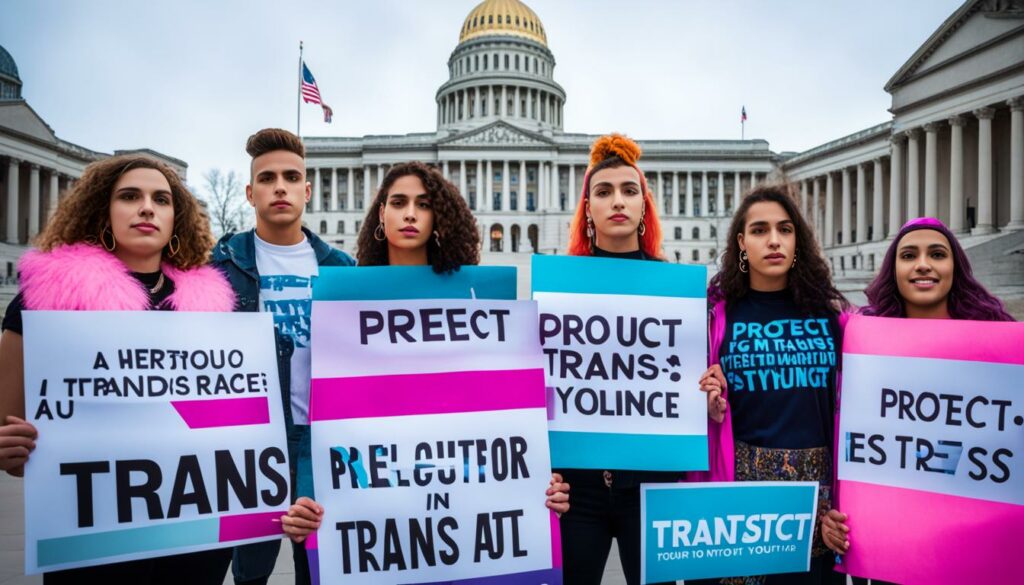Supporting a Trans Teen in a Hostile State
Many states in the United States, including Texas, Arkansas, Tennessee, and Kansas, have recently introduced and passed anti-LGBTQ+ bills that specifically target transgender and nonbinary youth. These discriminatory bills aim to restrict their rights and access to basic services, such as participating in school sports and receiving gender-affirming healthcare. As a result, trans teens in these anti trans states face a hostile environment and an increased risk to their well-being.
However, there are ways to support and uplift trans teens amidst these challenges. Advocacy, resources, and support networks play crucial roles in ensuring their safety, mental health, and overall well-being. By coming together as a community, we can make a positive impact and work towards a more inclusive future for transgender youth.
Key Takeaways:
- Anti-trans legislation threatens the rights and well-being of trans teens in particular states.
- Advocacy, resources, and support networks are vital in supporting trans teens amidst these challenges.
- Listening to and validating the experiences and gender identities of trans teens is essential for their well-being.
- Understanding state policies and accessing relevant resources can help navigate the challenges faced.
- Connecting with supportive communities and engaging in political action are crucial steps in creating change.
The Impact of Anti-Trans Legislation on Trans Youth

The rise in anti-trans legislation has had a profound and detrimental impact on trans youth. These discriminatory laws not only undermine the rights of transgender individuals but also amplify discrimination and perpetuate transphobia. The consequences of such legislation extend far beyond legal limitations; they directly invalidate the identities of trans youth, causing immense harm to their well-being and mental health.
This constant assault on the rights of trans youth by elected officials creates an environment of fear, anxiety, and confusion. Trans teens face significant psychological distress as they navigate through a society that denies their true selves. The erasure of transgender identities and the prevalence of transphobia contribute to the already complex mental health challenges faced by these vulnerable individuals. Tragically, the increased risk of suicide among trans youth is a harrowing consequence of this hostile environment.
It is crucial, now more than ever, to provide comprehensive support and resources to help trans youth navigate through these difficult circumstances. The resilience and well-being of these individuals hinge on the collective efforts of society in fostering acceptance, understanding, and inclusivity.
“Transgender rights are human rights. Everyone deserves the freedom to live their authentic lives without discrimination or fear.”
The Importance of Transgender Rights Advocacy
Transgender rights advocacy plays a pivotal role in protecting the well-being and rights of trans youth. By speaking out against discrimination, raising awareness about the challenges faced by individuals in the transgender community, and urging for inclusive policies, advocates can help combat transphobia and systemic inequality.
Addressing Discrimination and Promoting Inclusivity
It is essential for society to recognize and challenge the discrimination faced by trans individuals. By promoting inclusivity and embracing the diversity of gender identities, we can create a more welcoming and supportive environment for trans youth. Through education, awareness campaigns, and creating safe spaces, we can work towards dismantling the barriers that perpetuate discrimination and prejudice.
Providing Mental Health Support
Given the immense emotional toll of discrimination and transphobia, it is vital to prioritize mental health support for trans youth. Accessible and affirming mental health services can help alleviate distress, provide coping strategies, and foster resilience in the face of adversity. Additionally, support networks and counseling services tailored to the unique experiences of trans youth play a crucial role in their well-being.
Empowering Trans Youth and Amplifying Their Voices
Empowering trans youth is pivotal in challenging discriminatory legislation and eradicating transphobia. By amplifying their voices, advocating for their rights, and providing platforms for them to share their experiences, we can shift societal perceptions and create a more inclusive and accepting world for future generations.
| Effects of Anti-Trans Legislation | Challenges Faced by Trans Youth | Supportive Actions |
|---|---|---|
| Undermines rights | Fear, anxiety, and confusion | Transgender rights advocacy |
| Amplifies discrimination | Psychological distress | Addressing discrimination and promoting inclusivity |
| Invalidates identities | Increased risk of suicide | Providing mental health support |
Listening to and Validating the Trans Teen

Supporting transgender students and promoting inclusive education is crucial for their well-being and success. To foster a positive environment for trans teens, it is essential to actively listen to and validate their experiences and identities. By providing the necessary support and respect, we can contribute to their overall happiness and mental health.
Respecting Gender Pronouns and Chosen Name
One of the fundamental ways to support transgender students is by respecting their gender pronouns and chosen name. Using the correct pronouns and addressing them by their chosen name affirms their gender identity and validates their sense of self. It shows that we acknowledge and respect their journey.
Creating a Safe Space for Expression
Trans teens should have a safe space where they can freely express their gender identity without fear of judgment or discrimination. By fostering a supportive and inclusive environment, we enable them to be their authentic selves. Providing opportunities for open dialogue and discussion helps to build trust and understanding.
Listening to trans teens and validating their experiences enables us to create a safe haven where they feel seen, heard, and accepted.
Offering Emotional Support
Emotional support is vital in helping trans teens navigate the challenges they face. Providing a listening ear, offering guidance, and offering encouragement can make a significant difference in their overall well-being. Letting them know that they are not alone and that they have someone they can rely on fosters resilience and mental health.
Inclusive Education for Trans Teens
Inclusive education plays a critical role in supporting the well-being of trans students. It involves creating an educational environment that recognizes and affirms their gender identity. Inclusive policies can include allowing them to use the restroom and participate in activities that align with their gender identity, as well as providing resources on transgender issues and promoting awareness and acceptance among peers.
To better understand the importance of inclusive education, let’s take a look at the following statistics:
| Statistic | Percentage |
|---|---|
| Trans students who feel safer with inclusive policies | 85% |
| Trans students who are more likely to pursue higher education | 70% |
| Trans students who report lower rates of depression and anxiety | 65% |
By implementing inclusive education policies, we not only create a supportive learning environment but also empower trans teens to thrive academically and emotionally.
Understanding State Policies and Accessing Resources

As a parent or caregiver of a transgender teen, it is crucial to familiarize yourself with the policies and regulations pertaining to transgender rights and healthcare access in your specific state. Each state may have different laws and resources available, so understanding the legal landscape is essential in advocating for your child’s rights.
In order to navigate the complex system, it is advisable to seek guidance and information from local LGBTQ community centers and organizations such as the ACLU. These organizations have invaluable expertise in transgender rights advocacy and can provide you with the necessary resources and support to protect your teen’s well-being.
Gathering information and resources about the specific laws and services in your state will empower you to make informed decisions and effectively advocate for your child’s rights. Here are some steps you can take to understand state policies and access relevant resources:
- Research state laws and regulations regarding transgender rights and healthcare access.
- Contact local LGBTQ community centers and organizations for information and guidance.
- Attend workshops or seminars conducted by advocacy groups to stay updated on the latest legal developments.
- Join support groups or online communities where you can connect with other parents navigating similar challenges.
- Utilize online resources provided by reputable organizations to access state-specific information and support networks.
By understanding state policies and leveraging available resources, you can effectively advocate for your trans teen and ensure their rights are protected. Enlisting the support of knowledgeable organizations and staying informed about changing laws can make a significant difference in their well-being and overall journey.
Connecting with Supportive Communities

Building a supportive community is crucial for both trans teens and their parents. Connecting with other parents of trans youth can provide a sense of understanding and solidarity during challenging times. It’s comforting to know that you’re not alone in navigating the journey of supporting your trans teen. Sharing experiences and seeking guidance from those who have gone or currently going through similar situations can be invaluable.
Fortunately, there are various LGBTQ+ youth organizations dedicated to supporting transgender youth and their families. Two notable organizations are:
PFLAG (Parents, Families, and Friends of Lesbians and Gays)
PFLAG is a national organization that advocates for LGBTQ+ rights and provides resources and support for parents, families, and friends. They offer local chapters across the United States where you can connect with other parents, attend support group meetings, and access educational materials. PFLAG also organizes events and workshops aimed at fostering understanding and celebrating diversity. Through their network, you can gain insight, advice, and a strong support system.
Trans Lifeline
Trans Lifeline is a crisis hotline run by and for transgender people. Their dedicated staff provides emotional support, resources, and referrals to those in need. Whether it’s for your trans teen or yourself, reaching out to Trans Lifeline can offer a safe space to talk, ask questions, and find solace. They understand the unique struggles faced by the transgender community and have knowledgeable volunteers who can provide valuable guidance.
Joining these supportive communities can help combat feelings of isolation and provide a reliable network where you can share your stories, ask for advice, and receive unwavering support.
Remember, you are not alone – there are people and organizations ready to help you navigate this journey. Your connection with other parents and LGBTQ+ youth organizations can make a significant impact in supporting your trans teen.
Engaging in Political Action
Engaging in political action is vital for LGBTQ+ rights advocacy and creating change for trans youth in anti-trans states. One powerful way to advocate for the rights of trans youth is by voting for elected officials who support LGBTQ+ rights and inclusive policies. By voting for supportive officials, parents can ensure that the voices of trans youth are represented and their rights are protected.
However, voting is just one aspect of political action. There are other impactful ways to advocate for trans youth and raise awareness about the challenges they face. Participating in protests and rallies can demonstrate solidarity and send a powerful message to lawmakers. These events provide an opportunity to amplify the voices of trans youth and demand justice and equality.
Another effective way to engage in political action is by contacting state representatives and sharing personal stories and concerns about anti-trans legislation. By sharing the experiences of trans youth and their families, parents can humanize the issues and illustrate the impact of discriminatory policies. This can help lawmakers better understand the need for inclusive legislation and the importance of protecting the rights of trans youth.
“Our fight for equality and justice requires us to actively engage in the political process. By voting for supportive officials and using our voices to advocate for the rights of trans youth, we can create a more inclusive and equitable society.”
In addition to these grassroots efforts, raising public awareness about the challenges faced by trans youth is crucial. Sharing stories, informational resources, and statistics about the impact of anti-trans legislation on trans youth can help educate communities and inspire collective action. Through social media campaigns, community events, and conversations with friends and family, parents can be powerful advocates for change.
It is important to remember that political action is an ongoing process. By remaining engaged, informed, and active in advocating for LGBTQ+ rights, parents can contribute to creating a more inclusive and accepting society for trans youth.
Table: Local and National LGBTQ+ Rights Organizations
| Organization | Mission | Contact Information |
|---|---|---|
| PFLAG | Provides support, education, and advocacy for LGBTQ+ individuals, their families, and allies. | Website: www.pflag.org Phone: 1-800-246-PRIDE (7743) Email: info@pflag.org |
| Transgender Legal Defense & Education Fund (TLDEF) | Works to ensure transgender people’s full equality through impact litigation, direct legal services, and public policy advocacy. | Website: www.transgenderlegal.org Phone: 1-646-862-9396 Email: info@transgenderlegal.org |
| Human Rights Campaign (HRC) | Advocates for LGBTQ+ equality and supports legislation and policies that protect LGBTQ+ rights. | Website: www.hrc.org Phone: 1-800-772-9100 Email: info@hrc.org |
Documenting Discrimination and Seeking Federal Support
If a trans teen is personally impacted by anti-trans policies in their state, it is crucial to document instances of discrimination and report them to the appropriate federal agencies. By reporting these acts of discrimination, individuals can raise awareness and inform the federal government about the challenges faced by trans youth in anti trans states.
The Departments of Education and Health and Human Services have forms available for reporting discrimination. Although immediate resolution may not be guaranteed, reporting incidents of discrimination helps to shed light on the issue and advocate for change. The information provided through these reports can be invaluable in pushing for policies that protect the rights and well-being of trans youth.
Addressing discrimination and seeking federal support is an essential step in combating the harmful effects of anti-trans legislation and working towards a more inclusive society.
In instances of discrimination, it is important to gather as much evidence as possible, including testimonies, photographs, and any other relevant information to support the claims. This documentation serves as a record of the discrimination experienced and strengthens the case for legislative action against anti-trans policies.
Reporting discrimination incidents helps advocate for the rights and well-being of trans youth, raises awareness, and informs the federal government about the challenges faced in anti trans states.
Transparency and documentation play a key role in shedding light on the realities of discrimination faced by trans youth. By utilizing the available reporting channels, individuals and communities can work towards change and foster a more inclusive and accepting society for all.
The Emotional Toll on Trans Teens and their Families
The constant attacks and hostile environment in anti-trans states have a profound emotional impact on trans teens and their families. The invalidation of their identities and the fear of discrimination can lead to significant mental health challenges, including anxiety, depression, and feelings of isolation. The emotional toll of navigating through such adversity cannot be underestimated.
In order to support trans teens and their families, it is crucial for parents and caregivers to provide emotional support and create a safe space for open communication. Encouraging open dialogue and actively listening to their experiences can help trans teens process their emotions and feel validated in their gender identity. Seeking therapy or counseling from professionals experienced in supporting gender diverse individuals can offer additional guidance and coping strategies to navigate mental health challenges.
Connecting with support networks is also essential for trans teens and their families. Engaging with LGBTQ+ organizations and communities can provide a sense of belonging, reduce isolation, and offer a platform for sharing experiences and receiving support from individuals who have faced similar challenges. These support networks can offer valuable resources, information, and empathy, creating a support system that understands and uplifts trans teens and their families.
“Finding support from others who have walked a similar path can be incredibly empowering and validating. It reminds us that we are not alone in this journey and that there is strength in our community.” – Sarah, parent of a trans teen
The Importance of Self-Care
Self-care plays a crucial role in supporting the emotional well-being of trans teens and their families. Encouraging healthy coping mechanisms such as engaging in hobbies, practicing mindfulness, and maintaining a balanced lifestyle can help alleviate stress and anxiety. Taking time for self-reflection and self-compassion can assist in navigating the ups and downs of the challenging circumstances.
It is also essential to stay informed about the latest legal developments and resources available to support trans youth. Understanding the rights and protections offered by federal and state laws can help families advocate for their rights and access necessary support services.
The Decision to Relocate for the Well-being of Trans Teens
Many families in anti trans states are faced with the difficult decision of whether to relocate in order to ensure the well-being and safety of their trans teen. Relocation may involve leaving behind support systems, familiar environments, and potentially incurring additional expenses. Parents must weigh the benefits of a safer and more inclusive environment against the challenges of uprooting their lives. Every family’s situation is unique, and the decision to relocate should prioritize the best interests and safety of the trans teen.
“Moving to a more accepting and inclusive community can offer a trans teen the opportunity to live authentically and without fear of discrimination.”
Relocating for the well-being of a trans teen involves careful consideration of various factors. It is a decision that reflects the unconditional love and commitment of parents towards their child’s happiness and safety. Moving to a more accepting and inclusive community can offer a trans teen the opportunity to live authentically and without fear of discrimination.
Challenges of Moving for Trans Teens and their Families
While relocating can provide a fresh start and a more supportive environment, it also comes with its own set of challenges. Some of the common challenges faced by trans teens and their families when moving include:
- Adjustment to a new community and social environment
- Securing new healthcare providers who are knowledgeable about gender-affirming care
- Transferring school records and ensuring a smooth transition in the education system
- Building new support networks and finding LGBTQ+ resources in the new location
- Financial considerations, including the cost of housing, transportation, and potential job changes for parents
These challenges require careful planning and support from both the trans teen and their parents. It is crucial to seek out local LGBTQ+ organizations, support groups, and healthcare providers who can assist with the transition and provide guidance during the relocation process.
“Relocating for the well-being of a trans teen demonstrates a strong commitment to their safety and happiness, even if it means uprooting their lives.”
Relocating for the well-being of a trans teen demonstrates a strong commitment to their safety and happiness, even if it means uprooting their lives. It is essential for parents to consider the long-term benefits and potential positive impact on their child’s mental health and overall well-being.
Conclusion
Supporting a trans teen in an anti trans state requires a collective effort from parents, community organizations, and advocates for LGBTQ+ rights. By listening, validating, and understanding the challenges faced by trans youth, we can provide the necessary support and resources to uplift and empower them.
Engaging in political action, connecting with supportive communities, and documenting instances of discrimination are concrete steps towards creating change. Despite the adversities posed by anti-trans legislation, there is hope and resilience in supporting trans teens and fighting for their rights.
Together, we can work towards a more inclusive and accepting society where trans teens can thrive and be their authentic selves. Let us stand together in solidarity, challenging discriminatory laws and championing the rights and well-being of trans youth. By supporting trans teens, we contribute to a brighter and more equitable future for all.
FAQ
How does anti-trans legislation impact transgender youth?
Anti-trans legislation undermines the rights and well-being of transgender youth, amplifies discrimination, and invalidates their identities.
How can we support and validate trans teens in anti trans states?
We can support trans teens by respecting their gender pronouns and chosen name, providing a safe space for expression, and offering emotional support.
What is the importance of inclusive education for trans teens?
Inclusive education that recognizes and affirms the gender identity of trans teens contributes to a positive and supportive school environment.
How can parents understand state policies and access resources for their trans teen?
Parents can seek information from local LGBTQ community centers, organizations like the ACLU, and research state-specific laws and resources.
How can connecting with supportive communities help families of trans teens?
Connecting with other parents of trans youth and LGBTQ+ youth organizations provides a sense of understanding, guidance, and support.
How can we engage in political action to support trans teens?
We can vote for elected officials who support LGBTQ+ rights, participate in protests, call state representatives, and raise awareness about the challenges faced by trans youth.
Is there a way to report discrimination and seek federal support?
Yes, instances of discrimination can be documented and reported to federal agencies like the Departments of Education and Health and Human Services.
What is the emotional toll of anti trans legislation on trans teens and their families?
Anti-trans legislation leads to anxiety, depression, and feelings of isolation for trans teens and can emotionally impact their families as well.
Should families consider relocating for the well-being of their trans teen?
Some families may choose to relocate to ensure the safety and well-being of their trans teen, considering the benefits and challenges of moving.
How can we support trans teens despite the adversity posed by anti-trans legislation?
By listening, validating, and understanding their experiences, engaging in political action, and connecting with supportive networks, we can uplift and empower trans teens.
Source Links
- https://www.newyorker.com/magazine/2023/10/16/a-trans-teen-in-an-anti-trans-state
- https://www.them.us/story/hell-on-earth-the-impossible-decisions-facing-families-of-trans-kids-in-hostile-states
- https://www.sheknows.com/health-and-wellness/articles/2614134/kids-teens-gender-affirming-healthcare-access/







